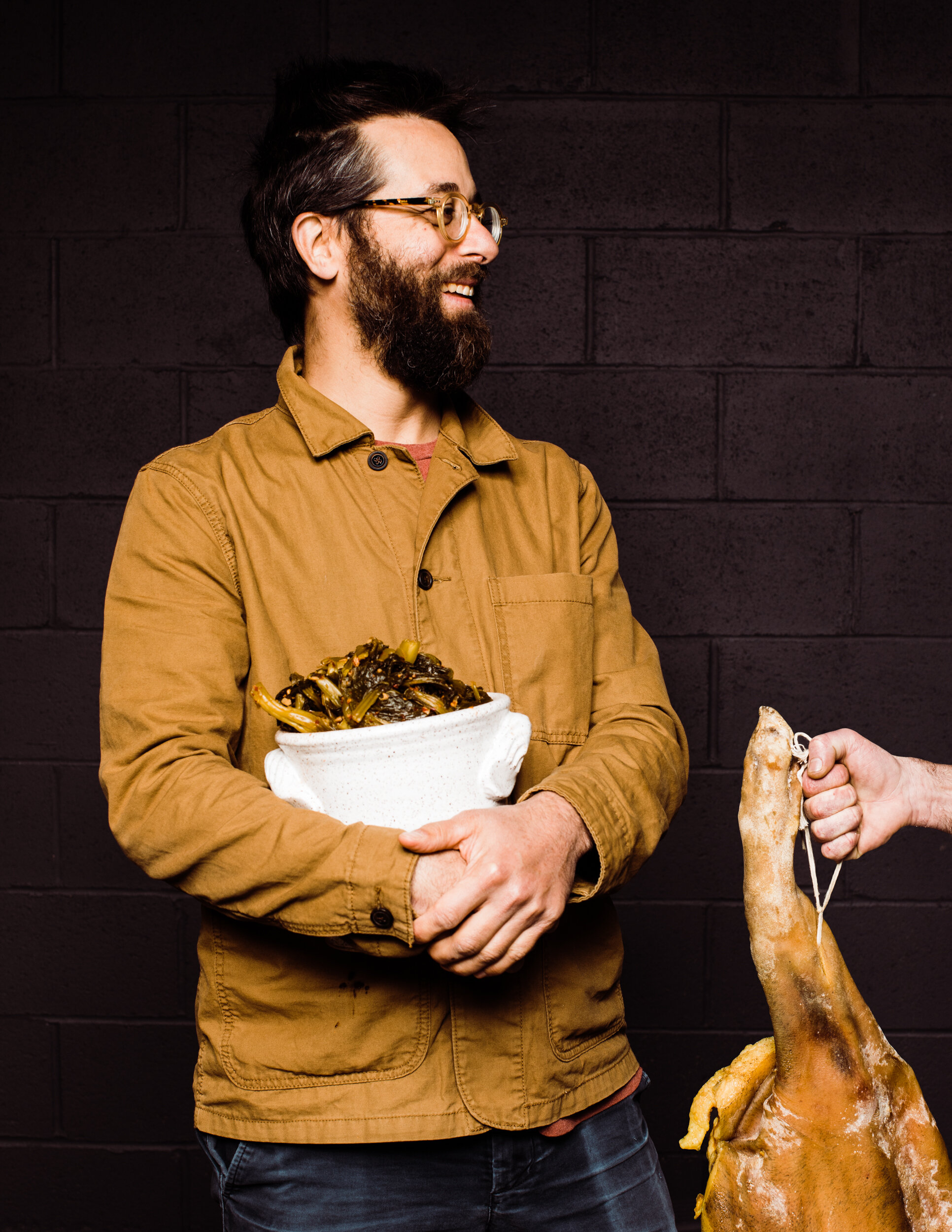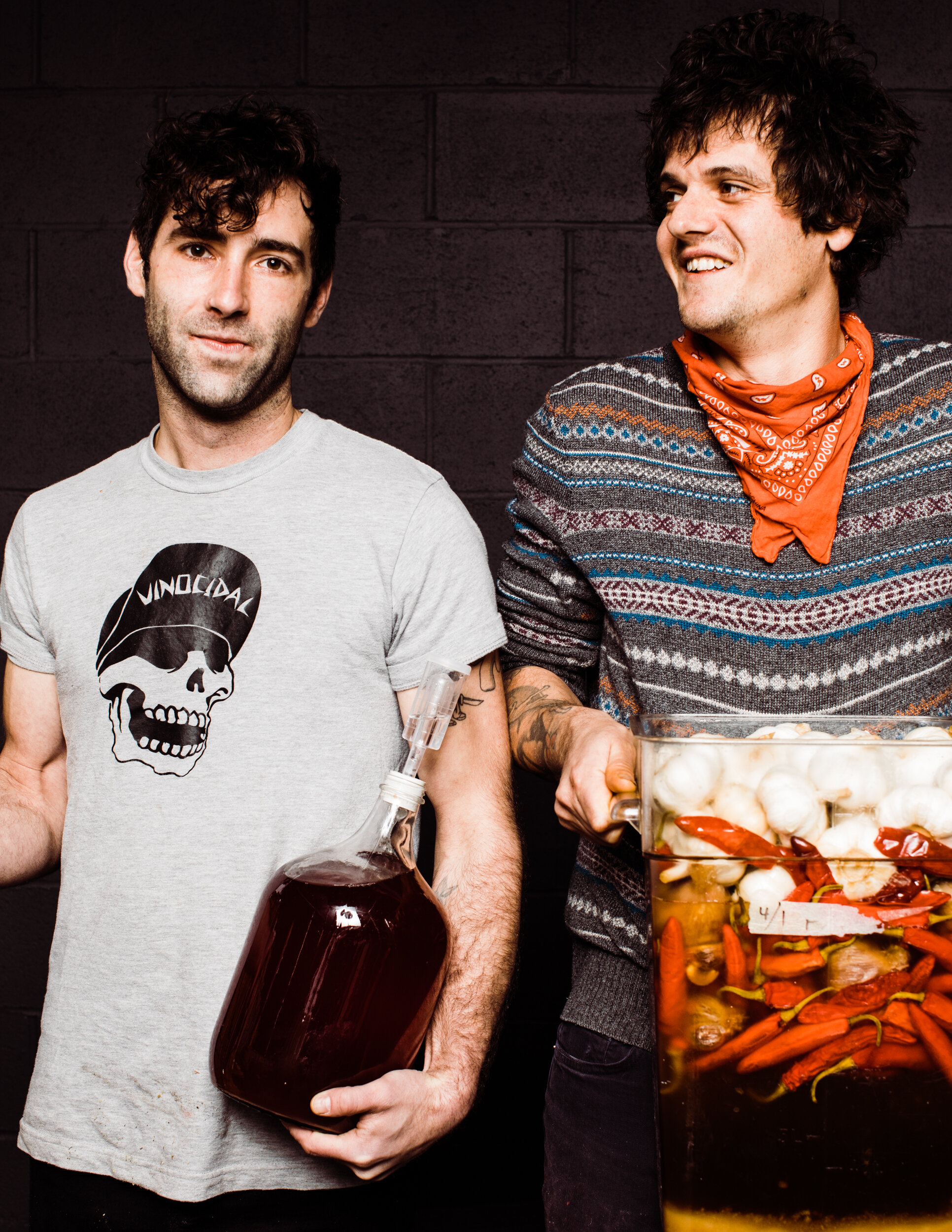Culture Club: A Potter, a Chef and Boston's Fermentation Community
Photos by Michael Piazza
It’s a bright and blustery morning on Washington Street in Jamaica Plain. The back patio of Brassica Kitchen + Café is quiet, save for the awning overheard snapping briskly in the wind.
Jeremy Ogusky, founder of Boston Ferments and the Boston Fermentation Festival, sits with his dog, Pula, occasionally feeding her treats from a bag on the table. Jeremy Kean, chef and owner of Brassica, peers energetically from behind a red bandana, while Brassica’s beverage director, Noah Todoroff, sports a graphic T emblazoned with the words Disco F-cks. Their common passion? A love of all things fermented.
Little pockets of fermentation are everywhere you turn— just open your fridge. There’s that wedge of Stilton you picked up on a whim. The quart of Greek yogurt you spoon over granola every day. The jar of miso paste you cracked open for last night’s salmon. Oh, and that earthy IPA at the back there, waiting patiently until the moment you have the time to savor it. A crusty loaf of sourdough. Your favorite funky kimchi. That package of tempeh you’re trying to figure out what to do with. These common culinary wonders many of us have somewhere in our kitchens all share one glorious trait—besides delighting our taste buds. They’re all the product of fermentation.
Humans have been experimenting with the anaerobic process of fermentation for thousands of years—there’s evidence of fermented alcoholic beverages made in Neolithic China as early as 7000 BCE—and until the invention of refrigeration during the mid-19th century, fermentation was essential to the preservation of food. With its oft-lauded gut health and immunity benefits, fermentation has grown in popularity in recent years. The trend has followed the rise of the health and wellness movements, as well as consumers’ desire for more sustainable food options and transparency surrounding their origin.
“We’ve been around for how long, surviving and needing to eat?” says Kean. “Using a refrigerator and refrigerated transportation is so new. It’s almost like we’re waking up in a way to something that’s been here and happening for the entire existence of our species.”
Ogusky and Kean met years ago through the Boston-based organization Let’s Talk About Food, where they were paired together to expound on the virtues of ferments— Ogusky on the topic of sauerkraut and Kean on kimchi. Ogusky, a professional potter by trade, supplied Kean with a few hand-thrown fermentation crocks. From there, pottery blossomed into a partnership. Many of the meals that emerge from the Brassica kitchen are plated on Ogusky Ceramics, and until the pandemic, Boston Ferments and Brassica teamed up to host frequent ferment-forward dinners and workshops in the restaurant. What started as a shared interest became a mutually beneficial relationship within the larger Boston fermentation world.
“For me, what drew me to fermentation is the community,” says Ogusky, whose background in public health informsmuch of his interest in community organizing and education. “I love that there are so many people working on it and that people can work together to learn about fermentation. I’ve always been interested in pulling people together and sharing information. That eventually culminated in the Fermentation Festival.”
The Boston Fermentation Festival, organized under the larger umbrella of Boston Ferments, got its start in Jamaica Plain as the brainchild of Ogusky and a few fermentation-enthusiast friends. The inaugural event at Egleston Farmers Market in 2013 was an unexpectedly huge success, drawing the ferment-obsessed in droves.
“It became this much bigger thing, and at the end of it we were all kind of shell-shocked,” says Ogusky. “We were, like, ‘Whoa, that was a lot.’ We just spent a lot of time and a lot more money than we ever expected, and this thing has legs, and it’s grown.”
Grown is an understatement. Ogusky now manages a team of more than 30 volunteers who spend the entire year planning the next year’s program. The annual festival has since moved to the Boston Public Market, and in 2018 upwards of 40,000 attendees made the trek, many from throughout New England and across the States, as well as some international devotees, including one intrepid traveler who flew from Australia.
“It brings together these science people, all these chemists and pharmacologists, and then it brings together the health and wellness folks, and folks who are interested in flavor and cooking. You get this weird mix of people, which is fun. Fermentation enables all these people to come and speak the same language,” says Ogusky.
You may be asking yourself, What does one do at a fermentation festival? The simple answer: You’d be very surprised. The 2019 schedule featured a Maker’s Marketplace and Local Libations with food, drinks and wares from professional New England fermenters like Brassica Kitchen + Café, Hosta Hill, Kitchen Garden Farm, Ogusky Ceramics and Democracy Brewing. There were speakers, panels and tastings led by fermentation experts from around the country. There was the Reading Room, where you could browse fermentation-forward literature and meet the authors, as well as the Demonstration Station, where you could learn firsthand from vendors how to make a variety of ferments, like beet kvass and kimchi. At the Science Corner, local microbiologists and entrepreneurs explored the bacteria around us. And if you were looking to trade your sourdough mother for kombucha SCOBYs? All you had to do was head over to the Culture Sharing Table to swap and discuss live cultures with other fanatics.
But the real centerpiece of each festival? The kraut mob—sort of the fermentation world’s answer to the rugby scrum. Community-led by highly skilled artisan “mobsters,” kraut mobs are a fun, communal and slightly chaotic way to learn the basics of fermenting and the ins and outs of sauerkraut or, as Ogusky calls it, “the gateway drug to fermentation.”
Boston Ferments has hosted kraut mobs everywhere from farmers markets to universities, teaching thousands of people in a day how to make sauerkraut with the intention of bringing together a community with an interest in fermentation.
The COVID-19 pandemic brought with it significant challenges for many in the food and dining industry, and Boston Ferments and the Fermentation Festival are no exception. The 2020 festival was canceled entirely, and the kraut mobs and workshops that Boston Ferments hosted monthly—many at Brassica—have all but ended for the foreseeable future.
“It’s totally not COVID-friendly,” says Ogusky. “Everyone is bunched together, talking, eating communally at big tables. Everyone is washing their hands and staying safe, but they’re all mixing and crunching cabbage in collective bowls with, like, 10 hands in them. It’s just not something that we would do now—but in the future.”
For now, with Boston Ferments gatherings and the Fermentation Festival on an indefinite hiatus and no immediate plans to bring those events into the virtual space, Ogusky is focusing his energy on promoting fellow fermenters and running his pottery business. He is also consulting on a new fermentation CSA box led by Kean, Todoroff and the Brassica team, including Kean’s sister Becca—Brassica’s CFO and general manager—and Chef Philip Kruta, Kean’s partner in their traveling culinary pop-up, Whisk. Launched in the fall of 2020 and available for pickup through BrassicaKitchen.com, the monthly CSA—dubbed Juice Box Ferments—offers a variety of housemade ferments and juices that will change each month, depending on what’s ready to be packaged. CSA subscribers can expect the unexpected in terms of selection, like misos, soy sauces, black apple butter, homemade sourdough, cultured butter and lacto-fermented candied peanuts.
Todoroff, who is spearheading the beverage components of the box, is sort of a mad scientist when it comes to his concoctions. Combining his wine knowledge and background in creative cocktail making, he builds unique flavor profiles of fermented beverages as he would cocktails, like a vanilla-infused Concord grape cordial using grapes plucked from Ogusky’s front yard.
Each box will contain an assortment of beverages and juices—as Todoroff likes to call them “because it’s fun”—like a house-fermented cherry, plum and rosemary spritzer, as well as libations from local brewers and winemakers. The team also hopes that subscribers to the CSA will eventually have the option to add Ogusky’s hand-thrown fermentation pottery to their box.
“When you purchase that, I think it can inspire a lot of action,” says Kean. “It’s an added beauty to something that’s already so beautiful. Mother Nature is the best artist.”
“It’s like the earth will do what it wants to do, and it’s so cool,” says Todoroff. “You know, falling asleep to the sounds of little bubbles bubbling, it’s like magic. It’s a magic little world. I love it. Love watching things come to life.”
The fermentation CSA launched on the heels of the pandemic, which left the wreckage of thousands of small businesses and restaurants in its wake. For Ogusky, Kean and Brassica, Juice Box Ferments is not just another creative venture—it’s an invention born from necessity.
“I guess I kind of saw the CSA as Boston Ferments, my business [Ogusky Ceramics] and Brassica Kitchen,” says Ogusky. “Each of them has gone through a lot in the last year, in the last six months especially. In a way, I was thinking of the project as trying to preserve these three entities but also transform them in a cool way, similar to when you’re fermenting food.”
“The community is incredible,” says Kean. “It seems to all be about sharing information and failure and learning. It’s so much less about owning something. It’s all about sharing it.”
bostonferments.com
brassicakitchen.com
oguskyceramics.com
This story appeared in the Winter 2021 issue.


